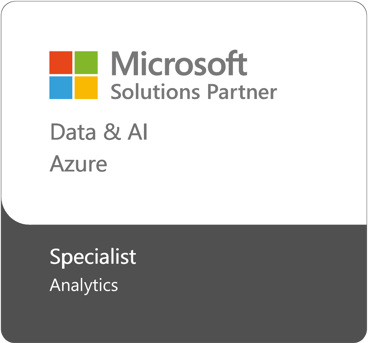Solid data, smart governance: “AI in Action” event explores how New Zealand is scaling AI with confidence
From concepts to confidence: “AI in Action” showed how NZ is scaling AI through solid data practices and smart, accountable governance.
It was a sell-out crowd for Enlighten Designs and Deloitte’s AI Breakfast Briefing on the 3rd of November: “AI in Action Event: From Governance to Real-World Implementation” — an indication that AI is no longer a boardroom curiosity in New Zealand but a strategic mandate.

Why This Event Mattered
The meeting brought together AI experts and business leaders at various stages of their AI journey - ranging from curious newcomers to hands-on practitioners, they were connected with a single shared question: How do we capture the upside of AI while managing the risks?
The answer came early. As Enlighten Designs' Drishti Ratna puts it, "AI isn't a filler that replaces people; it's a multiplier that supercharges workflows, cuts time on repetitive tasks, and lets staff focus on higher-value work." That framing anchored the conversation in execution: where to start, how to govern, and how to build trust moving AI from proof-of-concept to production.
Event Highlights
Verne Roberts: Your AI Is Only as Good as Your Data
Verne Roberts, Principal of Data & AI at Enlighten Designs, opened with the reality check most organisations need to hear: if your data isn't ready, your AI isn't either.
"Your AI is only as good as your data" - but most companies are building their AI dreams on quicksand. Verne Roberts, Principal Technologist for Data & AI at Enlighten Designs, revealed why 42% of companies are already abandoning their AI initiatives and what the successful 20% are doing differently.
The Shocking Reality While everyone's racing to implement ChatGPT and AI assistants, Verne shared some sobering statistics: 99% of AI projects hit data quality roadblocks, and in New Zealand alone, 80% fail entirely because of poor data foundations. The result? AI systems that "hallucinate" - creating convincing but completely fabricated answers.
The Secret: Build Your Data House Right
The companies winning at AI aren't starting with the flashy stuff. They're following a proven four-stage journey that delivers measurable ROI at every stage:
Stage 1 - Get Your Facts Straight (Descriptive Analytics): Before any AI magic, successful companies master basic reporting. The payoff? Over 90% see immediate measurable value just from knowing what's actually happening in their business.
Stage 2 - Understand the Why (Diagnostic Analytics): Next, they build the ability to dig deeper into their data. This transforms decision-making from "I think" to "I know."
Stage 3 - Predict What's Coming (Predictive Analytics): Only now do they add machine learning for forecasting. The market opportunity here is exploding - growing from $22B to $92B by 2032.
Stage 4 - AI That Actually Works (Prescriptive Analytics): Finally, they're ready for advanced AI and GenAI that delivers real business outcomes, not just impressive demos.
The Foundation That Makes It All Work: Verne emphasized that everything starts with Infrastructure-as-Code and Microsoft's Cloud Adoption Framework (CAF) as the bedrock. From there, each stage requires a solid operational backbone - progressing from DevOps through DataOps, MLOps, and finally LLMOps.
The Bottom Line: Companies that get this progression right see 30-50% higher revenue growth than their peers. Skip the foundation, and you join the 80% that fail. Build it right, and AI becomes your competitive advantage instead of an expensive disappointment.
Deloitte: AI Governance as a Growth Engine
Next up was Deloitte, with their extensive knowledge of AI policy, governance, and risk management. Reenesh Bhana (Partner, Risk, Regulatory and GRC Solutions) and Mariette van Niekerk (Director, Trustworthy AI Lead), outlined what effective AI governance looks like in practice:
-
Define guardrails and set expectations early: Understand your AI usage landscape (including Shadow AI). Set clear expectations for privacy, IP protection, confidentiality, and third-party data handling.
-
Embed risk disciplines early: Shift left on security, bias monitoring, and data provenance so the considerations aren’t an afterthought.
-
Build accountability: Use AI performance dashboards, continuous monitoring, and escalation paths that tie into existing risk capability, governance mechanisms and processes.
-
Leverage tooling and capability for ongoing monitoring of quality and risks: As AI scales across the organisation, manual processes and monitoring quickly become overly burdensome and inefficient. Identify tools for governance “pathways” and automated monitoring and reporting on key risks and measures.
-
Find the balance: Where you start is driven by your current maturity - just as with AI delivery, a staged approach to AI governance that scales with you is key. Too much experimentation without governance leads to stalled initiatives; too much policy without delivery lets competitors move faster.
AI is moving fast; governance shouldn’t lag behind. Organisations should not wait for ‘perfect’ to start building trust and resilience around AI. Rather, the aim should be to shape and iterate governance efforts as maturity and usage increases – whether this be defining principles, setting guardrails or just asking the critical questions around “what could go wrong?” and “what must go right?” Finally, leadership in this space is critical, and there is a call to action for leaders to consider what they would do differently to promote safe outcomes for the use of AI across their organisations.
Damon Kelly: Making AI Real - A Recruitment Case Study
To close out the morning, Damon Kelly, CEO of Enlighten Designs, presented a case study that showcased successful AI works in the real world.
He shared how Enlighten transformed its recruitment process. What once required 290 hours of manual work now takes just 16 hours. This wasn't about replacing recruiters; it was about freeing them from repetitive, time-consuming tasks so they could focus on what matters most: finding candidates with the right experience and cultural fit.
The case also highlighted fairness. AI eliminated the inherent bias of first impressions and focused purely on experience and expertise, making the process more objective and equitable.
Key takeaway: When designed with planning and forethought, AI doesn't replace human judgment—it amplifies it. It gives people time to focus where their insight has the most impact. Explore how AI can transform your workflows.
Your Next Steps: Build Your AI Foundation Now
The takeaway for executives is straightforward and actionable: it's time to bring AI into your business strategically—if you haven't already.
Here's how to start:
-
Conduct a data readiness assessment to understand where your foundations stand
-
Codify your generative AI policy and assurance checks so governance is embedded, not bolted on
-
Select two high-impact, well-governed use cases to productise in the next quarter
Enlighten Designs and Deloitte can help you translate AI governance and data strategy into shipped, scalable AI capabilities.




